Wed 12 February, 2020
-
Quick Links
-
Introduction
-
Industry update
-
Facts and Figures
Introduction
At the start of both a new year and decade, there is no question that housing, and specifically housing supply, remains at the top of the domestic policy agenda. The industry has been called upon to deliver a further one million new homes over the course of the Parliament with a more ambitious target of achieving 300,000 new additions each year by the mid-2020s.
However, the challenge facing the home building industry is not just a question of numbers. Equally important are issues regarding the environment, build quality, securing the future talent pipeline and building sustainable communities, to name a few.
As such, the priorities of the home building industry for 2020 and beyond are centred around four key themes: Environmental and social responsibility, talent, quality and delivery and housing affordability.
The remainder of this briefing is intended to provide you with information on:
- Industry activities in these areas
- Statistics regarding home building
- Key challenges and opportunities facing the sector
- HBF policy work and campaigns
We hope you find it useful but if you have any questions or would like to discuss the opportunities and challenges facing the home building sector in more detail, please contact:
David O’Leary, Policy Director: david.oleary@hbf.co.uk, 0207 960 1612
Emma Ramell, Policy and Public Affairs Manager: emma.ramell@hbf.co.uk, 0207 960 1608
Jamie Allan, Policy and Public Affairs Assistant: jamie.allan@hbf.co.uk, 0207 960 1618
Further information can also be found on our website www.hbf.co.uk.
About HBF
The Home Builders Federation (HBF) is the representative body of the home building industry in England and Wales. Our members are responsible for providing around 80% of all new private homes built in England and Wales and most of our members are small or medium-sized enterprises.
Industry update
Home builders outline ambition to develop net zero delivery roadmap
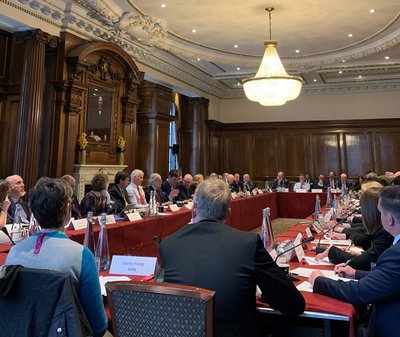
HBF hosted a Housing and Environment Summit in January that brought together key stakeholders including home builders, lenders, officials, manufacturers and environmental groups to plan a roadmap for achieving net zero carbon housing and other environmental objectives.
While the industry has made significant progress in recent years (new homes built today already produce carbon emissions 70% lower than a typical older property), home builders are under no illusion that 2020 is the year in which they will need to make a considerable step forward. Just some of the challenges industry is facing include:
- Helping the UK reach net zero carbon emissions by 2050
- Delivering 10% biodiversity net gain on new housing developments
- A 31% reduction in the carbon emissions from new homes
- Introducing low carbon heating on new developments
- A range of environmental ambitions: Reducing air pollution, improving water efficiency, mitigating the impacts of development on coastal habitats, ensuring flood resilience, reducing disposal of soil waste, enhancing landscape beauty and enabling electric vehicle charging
- Empowering customers to appreciate the different technologies that will be used in their homes
The industry is determined to deliver on these ambitions, but the scale of the challenge means that we cannot work in isolation if we are to be successful. Therefore, we are pleased to report that a clear commitment for all parties to work in partnership resulted from the Summit. A draft proposal for taking this workstream forward is now in the final stages of development.
This work will ensure that the industry is in the best possible position to deliver the supply of housing the nation needs while playing a vital role in tackling climate change and enhancing the natural environment.
HBF to celebrate the contribution of home building to local communities
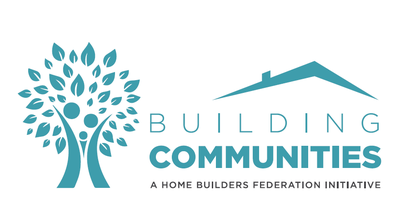
The contribution home builders make to local communities will be the focus of a new report and campaign by HBF, set to launch next month.
While the importance of the home building industry in addressing issues concerning housing supply is well-documented, its role as a key driver of economic growth, both nationally and locally, and as a supporter of sustainable communities, is increasingly, but not yet fully, recognised.
To facilitate an understanding of the broader importance of home building, HBF is launching ‘Building Communities’ Week (W/C 23 March) to help celebrate the ways in which developers are meeting the needs of local people. From building schools and GP surgeries to creating parks, green spaces and leisure facilities, our members are integral to the growth and investment in communities up and down the country.
A range of case studies, from both large and small developers, will be showcased in a report that will be launched during a reception on 25th March, 4-6pm, Churchill Room, House of Commons.
If you would like to attend and find out more about the benefits of home building, please contact emma.ramell@hbf.co.uk.
HBF welcomes government announcement on First Homes

Following the launch of the First Homes consultation on 7 February, HBF has welcomed government plans to improve the affordability of new homes for first-time buyers.
Under the proposals, new homes will be sold to local people with a discount of at least 30%. It is hoped the scheme will enable people who want to stay in the community where they live or work but who cannot afford to purchase a home at market prices. The discount will also be held in perpetuity, allowing future home buyers to benefit.
The home building industry is committed to helping prospective homeowners overcome the barriers of housing affordability and supply. HBF is therefore supportive of the principles that underpin the First Homes proposals and we look forward to working with the Government, local authorities and mortgage lenders to ensure the scheme is both workable and attractive to homebuyers.
If you would like to discuss the industry’s position on First Homes in more detail, please contact david.oleary@hbf.co.uk.
Mental Health Awareness Campaign: One year on

Last year, HBF launched its Mental Health Awareness Campaign in conjunction with Lighthouse Club, a charity dedicated to providing financial and emotional support to the construction community and their families.
While tackling poor mental health is a challenge across the UK, it is particularly acute within construction:
- Every working day two construction workers take their own life
- A construction worker is more likely to die from suicide than a fall from height
- The risk of suicide among male labourers is three times higher than the male national average
The home building industry acknowledges that it has a responsibility to create an environment in which people feel able to admit that they are not ‘OK’ and know where to turn for advice and support without fear of judgement.
This is why HBF launched a Mental Health Awareness Campaign. Together with our members, we are working to raise awareness of mental health problems, train people to spot the signs that a colleague may be struggling and better signpost the help available such as the Construction Industry Helpline.
Almost 12 months on from the Campaign’s launch, we are pleased to report that considerable progress has been made:
- Over 50 developers have signed up to support HBF’s Mental Health Campaign
- The industry has raised over £120,000 for the Lighthouse Construction Industry Charity
- The home building industry has trained over 650 Mental Health First Aiders (MHFA)…this equates to 1,300 mental health training days undertaken by the industry
- A third of MHFAs are based on site
- In 12 months’ time, we expect there will be more than 1,000 MHFAs in home building
Carrying forward the momentum of the campaign, HBF is exploring how we can increase awareness of the campaign among the supply chains to ensure that all employees across the industry are aware of where to turn for help should they need it. We will also continue to promote good mental health in home building, including during Mental Health Awareness Week in May.
For further information, please visit our website or contact emma.ramell@hbf.co.uk.
Skills Partnership awarded £1.9m to attract more people into home building careers
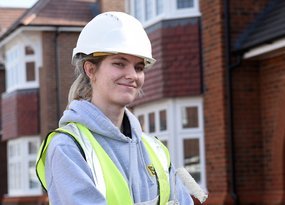
HBF’s Home Building Skills Partnership (The Partnership) aims to develop, grow and sustain a programme to provide the workforce the industry requires to deliver the further increases in housing supply the country desperately needs. It focuses on attracting new entrants into the industry, and on providing focussed training to develop the qualified workforce needed to construct today’s high-quality new homes.
Therefore, we are delighted that The Partnership has been awarded £1.9m as part of CITB’s Pathways into Construction initiative, which will increase diversity and inclusion in the home building industry by helping employers draw from a more diverse pool of talent.
The funding is being used over a three-year period to attract new entrants into the industry from four key underrepresented groups: women, further education (FE) students, service leavers and those not-in-employment-education-or-training (NEETs).
As of January 2020, significant progress has been made in establishing each Pathway:
- FE Leavers – 156 students have signed up to the programme, with nine employers engaged and supporting the scheme. Additionally, 14 colleges across Kent, Surrey, East Sussex, Essex and Surrey are participating in the programme
- Women – All but two of the 15 work experience placements in London have been completed. Two women have already received job offers and several are currently interviewing for permanent positions. 40 women have signed up for the new Midlands programme, which is being supported by 10 employers
- Service leavers – Two Pathway models are in development, with negotiations underway with two potential delivery partners across the UK
- NEETs – The first pathway for NEETs will be launched in February in Nottingham and Nottinghamshire delivery partner Futures. Delivery partners are being sought in other regions across the UK. The partnership is also working with two homebuilders regarding the prospect of bespoke programmes for them in Liverpool and North Wales
If you would like further information about the initiative, please do not hesitate to contact us.
Will you become a home building careers champion?

Critical to the success of the home building industry is its workforce. Quite simply, if we are to start delivering 300,000 new homes per annum by the mid-2020s, then we need the best and brightest of the workforce, both now and in the future.
As the development of a new home starts long before the first brick is laid, the industry requires an extensive and varied mix of skills. From identifying the land needed for the creation of new communities, to the design and architecture of buildings, through to the engineering, construction and sale of new homes, there are opportunities for people of all backgrounds and talents to develop a rewarding career in the industry.
With the increasing demand for housing, it is vital that we continue to attract a broad range of entrants into the sector. Therefore, we invite you to join us at our Parliamentary drop in session on Wednesday 4 March in Thames Pavilion, House of Commons between 13:00 – 14:30 to help champion the opportunities available in the industry.
The session will provide a valuable chance to learn more about the variety of career opportunities in the home building industry, the diverse range of people working in the sector, and a chance to meet with some of the individuals and apprentices from across the country who are the future of the industry.
At the event, HBF will also be launching a new publication profiling the range of careers on offer in the home building industry. Building a Future: Opportunities in Home Building profiles the diverse roles required to deliver the increases in housing supply the country desperately needs. HBF is focused on attracting new entrants into the industry and on providing training to develop the qualified workforce needed to construct today’s high-quality new homes.
As part of the drop in, you will have the opportunity to become a champion of the skilled and diverse workforce in the home building industry and take part in a photo opportunity with individuals from across the sector.
We hope you will be able to join us at the drop in. Please contact emma.ramell@hbf.co.uk to confirm your attendance.
Facts and Figures
Housing Supply: 93% increase in six years
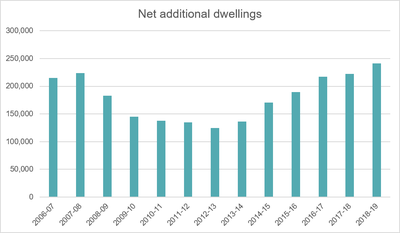
A lot of the discussion on barriers to home ownership has focused on the issues of ‘supply’ and ‘affordability’. The home building sector is committed to helping buyers overcome these barriers by driving forward the supply of housing, tackling problems of affordability and reversing declining rates of home ownership. Considerable progress has been made in recent years:
- There were 241,130 net additions to the housing stock in 2018/19, of which 214,000 were new build completions: the highest number since the 1980s.
- In the past six years, housing supply has almost doubled (up 93%) since a low of just over 124,000 in 2012/13.
- Over a million homes have been added to the housing stock in the past five years.
While considerable progress has been made in recent years, with a target of delivering 300,000 new homes each year by the mid-2020s, it is evident more still needs to be done. The home building industry is responding to this challenge by planning for further growth; permissions for 385,973 new homes were granted in 2018, underlining the industry’s intent to build even more homes in the years ahead.
Help to Buy: 81% of purchases made by FTBs
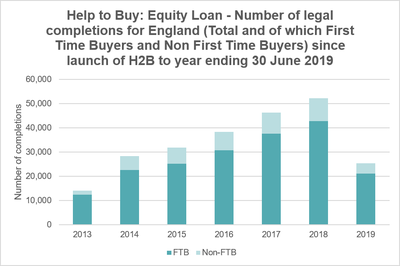
The Help to Buy Equity Loan Scheme is a key driver in reversing recent declines in home ownership levels amongst young people.
Over the period since the launch of the Help to Buy: Equity Loan scheme (1 April 2013 to 30 June 2019), 236,313 properties were bought with an equity loan.
- 81% of purchases using Help to Buy have been bought by First Time Buyers (FTBs)
- To date, 82% of new homes bought with Help to Buy were for £350,000 or less
- The proportion of houses sold under the scheme on a leasehold basis has declined rapidly since 2017 – just 1.6% of houses sold under Help to Buy in Q2 2019 were on a leasehold basis.
Some critics of the scheme claim that its presence drives up new build house prices. However, since the scheme’s introduction, new build prices have continued to track the wider market. In the period December 2012 to December 2017, the average new build price increased by 38.1% compared with 35.6% amongst existing properties.
A new Help to Buy Scheme, restricted to first time buyers and implementing regional price caps is set to open in 2021 and close in 2023. As such, HBF and its members have started to explore private sector-led options for addressing some of the void that will be left in mortgage market once the scheme has ceased operation.
If you would like information on how the current scheme is helping FTBs in your constituency, please don’t hesitate to get in touch.
Affordable Housing: 49% of affordable housing completions derived from Section 106 contributions
The substantial increases in housing supply seen in recent years has meant that the private homebuilding industry is playing a vital role in delivering affordable housing.
A report commissioned by MHCLG and published in 2017 showed that a growing proportion of the land value captured on new residential development sites through Community Infrastructure Levy (CIL) and Section 106 (S106) contributions is being directed towards affordable housing (around two-thirds of the £6bn raised in 2016/17).
In terms of direct provision, 49% of all affordable housing completions in 2018/19 were derived from Section 106 contributions, up from 47% the year before, illustrating the increasing reliance on the private sector in delivering new affordable homes. In fact, 60% of homes built for social rent last year were funded through Section 106 contributions.
Overall, an additional 57,485 affordable homes were delivered in England in 2018-19 with delivery 22% higher than the previous year.
Planning Permissions: Home builders are continuing to invest
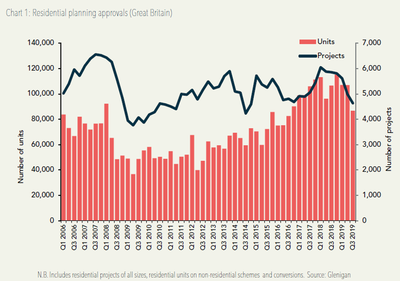
Planning permissions are a strong indicator of future housing supply. HBF/Glenigan’s latest Housing Pipeline report, published in January 2020, showed that planning permissions are still continuing to be granted at high levels. In total, 385,973 permissions were granted for residential units in England last year, compared to 369,417 in 2017.
This demonstrates the huge investment being made by house builders as they build on recent increases in housing supply to deliver even more new homes.








